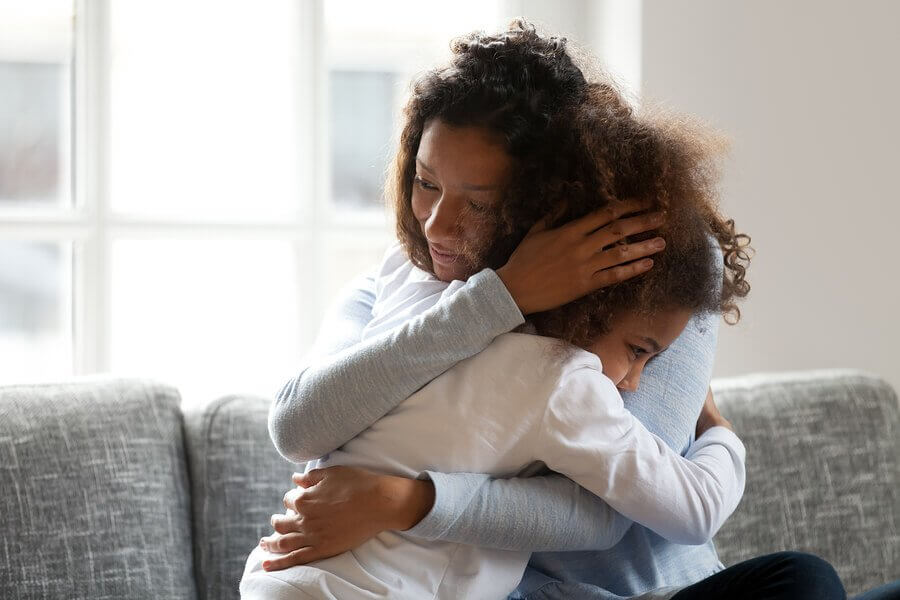Separation Anxiety: How to Deal with It

It’s natural for young children to feel separation anxiety when they’re away from their parents. After all, their parents are the ones who take care of them and make them feel calm.
Although it’s very emotional saying goodbye to your baby, it’s normal for children’s development. This happens because of the strong bond that’s been building for months between baby and mother.
By using good strategies, leaving your child won’t be as big of a problem. However, if separation anxiety intensifies or goes on for a long time, you should seek professional help. That way, you can prevent it from becoming a serious disorder.
How to face separation anxiety
1. Practice small separations, first for a short amount of time and short distances
Plan small trips that help you spend time away from your children for a short amount of time. Leave them in safe hands.
Gradually, your children will become more confident because they know you’ll come back. They’ll know that even if you say goodbye, they’ll see you again.
2. Pick a good time to leave
Make sure that before saying goodbye that your children are well fed and got enough sleep. In fact, children are more likely to experience separation anxiety when they’re tired or hungry.
3. Create a short goodbye ritual to prevent separation anxiety
Routines or rituals that you make as a family are very important for children. Make sure that this moment is as short as possible so your children don’t have time to think about getting anxious.
Also, try to get out of sight quickly. Tell your children you’re leaving, that you’ll be back soon, then leave.
4. Make sure your child has a constant caregiver
Whether it’s a daycare or with a nanny at home, try to keep these people around for a while. This way, there’s more consistency in your children’s life so they’ll feel more secure.

5. Stay on top of what your children see on television
Lots of things that children see on TV can make their fears worse. Fear is a factor that increases separation anxiety drastically.
“By using good strategies, leaving your children won’t be as big of a problem. However, if separation anxiety intensifies or goes on for a long time, you should seek professional help.”
Symptoms of separation anxiety
- Afraid that something awful will happen to your loved one. For example, many children think their parents will get sick or hurt when they’re not with them.
- Concern for unpredictable events that lead to permanent separation. Kids with separation anxiety worry about things like kidnappings, loss, and even death.
- Refuse to go to school. Children with separation anxiety won’t want to go to school. They’ll do anything to avoid having to leave the house.
- Difficulty falling asleep. Many children who suffer from separation anxiety also suffer from insomnia. They commonly have nightmares and don’t like being alone at night.
- Physical discomfort, like stomachaches and headaches. One of the most common symptoms of this issue is that children have physical symptoms.

- Hold on to you before saying goodbye. This attachment, whether to their parents or caregivers, is normal to a point. However, it stops being healthy when it prevents them from doing daily activities and playing with their friends.
Conclusion
Saying goodbye doesn’t always have to include crying and drama. The strategies mentioned above can help make things easier for you and your little ones.
However, if you think the situation is getting out of hand, you should start to think about whether it’s becoming separation anxiety. Pay attention to your child’s symptoms, and act immediately if you think your child suffers more than normal. Then, if necessary, go to a professional.
It’s natural for young children to feel separation anxiety when they’re away from their parents. After all, their parents are the ones who take care of them and make them feel calm.
Although it’s very emotional saying goodbye to your baby, it’s normal for children’s development. This happens because of the strong bond that’s been building for months between baby and mother.
By using good strategies, leaving your child won’t be as big of a problem. However, if separation anxiety intensifies or goes on for a long time, you should seek professional help. That way, you can prevent it from becoming a serious disorder.
How to face separation anxiety
1. Practice small separations, first for a short amount of time and short distances
Plan small trips that help you spend time away from your children for a short amount of time. Leave them in safe hands.
Gradually, your children will become more confident because they know you’ll come back. They’ll know that even if you say goodbye, they’ll see you again.
2. Pick a good time to leave
Make sure that before saying goodbye that your children are well fed and got enough sleep. In fact, children are more likely to experience separation anxiety when they’re tired or hungry.
3. Create a short goodbye ritual to prevent separation anxiety
Routines or rituals that you make as a family are very important for children. Make sure that this moment is as short as possible so your children don’t have time to think about getting anxious.
Also, try to get out of sight quickly. Tell your children you’re leaving, that you’ll be back soon, then leave.
4. Make sure your child has a constant caregiver
Whether it’s a daycare or with a nanny at home, try to keep these people around for a while. This way, there’s more consistency in your children’s life so they’ll feel more secure.

5. Stay on top of what your children see on television
Lots of things that children see on TV can make their fears worse. Fear is a factor that increases separation anxiety drastically.
“By using good strategies, leaving your children won’t be as big of a problem. However, if separation anxiety intensifies or goes on for a long time, you should seek professional help.”
Symptoms of separation anxiety
- Afraid that something awful will happen to your loved one. For example, many children think their parents will get sick or hurt when they’re not with them.
- Concern for unpredictable events that lead to permanent separation. Kids with separation anxiety worry about things like kidnappings, loss, and even death.
- Refuse to go to school. Children with separation anxiety won’t want to go to school. They’ll do anything to avoid having to leave the house.
- Difficulty falling asleep. Many children who suffer from separation anxiety also suffer from insomnia. They commonly have nightmares and don’t like being alone at night.
- Physical discomfort, like stomachaches and headaches. One of the most common symptoms of this issue is that children have physical symptoms.

- Hold on to you before saying goodbye. This attachment, whether to their parents or caregivers, is normal to a point. However, it stops being healthy when it prevents them from doing daily activities and playing with their friends.
Conclusion
Saying goodbye doesn’t always have to include crying and drama. The strategies mentioned above can help make things easier for you and your little ones.
However, if you think the situation is getting out of hand, you should start to think about whether it’s becoming separation anxiety. Pay attention to your child’s symptoms, and act immediately if you think your child suffers more than normal. Then, if necessary, go to a professional.
All cited sources were thoroughly reviewed by our team to ensure their quality, reliability, currency, and validity. The bibliography of this article was considered reliable and of academic or scientific accuracy.
- Robinson, L.; Seagal, J., Smith, M. Separation anxiety: What is it?. https://www.helpguide.org/articles/anxiety/separation-anxiety-and-separation-anxiety-disorder.htm?pdf=true.
- Harvard Medical School Special Health Report. Anxiety and Stress Disorders: A guide to managing panic attacks, phobias, PTSD, OCD, social anxiety disorder, and related conditions – Harvard Medical School Special Health Report https://www.health.harvard.edu/mind-and-mood/coping-with-anxiety-and-stress-disorders
This text is provided for informational purposes only and does not replace consultation with a professional. If in doubt, consult your specialist.








